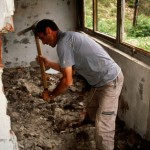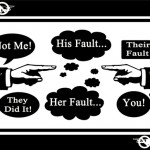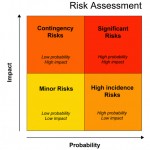 Had a fire? Sometimes, the damage done is just too much to bear. It could be that it is so extensive that governmental requirements won’t let a previously permitted use to resume at the property. That can happen if zoning ordinances permitted retail use of the property when the building was erected, but the law was later changed such that retail use was no longer permitted. “Grandfathering” goes only so far; most ordinances “revoke” the “grandfathered” status when half or more of a building is destroyed. Ordinances vary as to how “half” is calculated, some basing it on floor area destroyed; some on the cost to restore; and still others using specialized formulas. [Read more…]
Had a fire? Sometimes, the damage done is just too much to bear. It could be that it is so extensive that governmental requirements won’t let a previously permitted use to resume at the property. That can happen if zoning ordinances permitted retail use of the property when the building was erected, but the law was later changed such that retail use was no longer permitted. “Grandfathering” goes only so far; most ordinances “revoke” the “grandfathered” status when half or more of a building is destroyed. Ordinances vary as to how “half” is calculated, some basing it on floor area destroyed; some on the cost to restore; and still others using specialized formulas. [Read more…]
Had A Fire? Enough About The Money: What About Reopening?
What Would Rent Insurance Be If There Were Such A Thing?
 So, the lease requires the tenant to carry a policy of “rent insurance” or requires the landlord to carry a policy of “rent insurance” or, worse, requires both of them to do so. What does that policy say and how does it work?
So, the lease requires the tenant to carry a policy of “rent insurance” or requires the landlord to carry a policy of “rent insurance” or, worse, requires both of them to do so. What does that policy say and how does it work?
Trick question! You won’t find a rent insurance policy. You may find a commercial property insurance endorsement providing coverage for “rental value,” but don’t look for “rent insurance.” While you are at it, don’t call it: “rental interruption insurance,” “rent loss insurance,” or “rental income insurance.” Those are nice concepts, but lack any precise meaning. If you want to call it “use and occupancy insurance,” go ahead, but that form of policy is long, long gone. [Read more…]
PrintOldies Are Not Necessarily Goodies, Especially When You Find Such Terms In Your Leases And Other Contracts
 We wanted to address “Rent Insurance” today, but got somewhat distracted when we started out by writing “there really isn’t something called ‘Rent Insurance,’ even if lease writers insist otherwise.” We then were going to describe “Business Interruption and Extra Expense Coverage” because that’s really what lease writers are thinking when they say “Rent Insurance.” That was to take us into “how all of that works” and “where it doesn’t work.” It would have been pages long. [Read more…]
We wanted to address “Rent Insurance” today, but got somewhat distracted when we started out by writing “there really isn’t something called ‘Rent Insurance,’ even if lease writers insist otherwise.” We then were going to describe “Business Interruption and Extra Expense Coverage” because that’s really what lease writers are thinking when they say “Rent Insurance.” That was to take us into “how all of that works” and “where it doesn’t work.” It would have been pages long. [Read more…]
In A Lease, If I Didn’t Do It And You Didn’t Do It: Who Should Suffer The Loss?
 Stuff happens. Ask Bill Nye or David Hare.
Stuff happens. Ask Bill Nye or David Hare.
And, in modern America, it seems as if someone else is always at fault, not me. [If you take no blame, it must be them; Who must then pay my fines. It’s really is quite the cleverest ploy; By which illogic shines. – Gary Bachlund.]
Actually, there are times when bad things happen and the landlord and its tenant are each “good people.” Here are some examples: [Read more…]
PrintWhat Lease Writers (And Others) Don’t Understand About Builders Risk Insurance Coverage
 When a lease makes a specific reference to “Builders Risk” coverage, we know the conversation is going to go sideways. That’s because the proponent of that provision rarely knows anything more about that kind of insurance than can be intuited from the words: “Builders Risk” itself.
When a lease makes a specific reference to “Builders Risk” coverage, we know the conversation is going to go sideways. That’s because the proponent of that provision rarely knows anything more about that kind of insurance than can be intuited from the words: “Builders Risk” itself.
Here is an opening premise: the normal (ISO) coverage form for “Building and Personal Property Coverage” does not pertain to buildings under construction. [The ISO, or Insurance Services Office, is an association of insurance companies and it promulgates commonly used insurance forms. Many, but not all carriers use these forms. So, people who really want to know what is or is not covered always need to look at the policy itself. Those who draft leases might want to requires insurance policies to be on ISO forms or be on the functional equivalent of those forms.] [Read more…]
PrintOh No, Not Another Change To What It Means To Be An Additional Insured!
 Hard as we try to “mix it up” and meter out our ramblings about insurance concepts affecting, landlords, tenants, and lenders, the insurance industry makes it pretty hard to do so. We were planning to Ruminate over purchase and expansion options this week and then Builders Risk insurance the week after that, but the ISO’s (Insurance Services Office’s) promulgation of some revised forms effective April 1 forced our hand.
Hard as we try to “mix it up” and meter out our ramblings about insurance concepts affecting, landlords, tenants, and lenders, the insurance industry makes it pretty hard to do so. We were planning to Ruminate over purchase and expansion options this week and then Builders Risk insurance the week after that, but the ISO’s (Insurance Services Office’s) promulgation of some revised forms effective April 1 forced our hand.
Ruminations sees two changes of interest to the leasing industry and they affect: (a) additional insureds; and (b) those who serve liquor or allow its on-premises consumption. We also see some ways to change our documents to counteract the effect of some of these changes. [Read more…]
PrintWait Until After The Fire To See If There Was Insurance Coverage
 Like it or lump it – the insurance industry doesn’t care about your problems as a landlord or a tenant or a lender. A lot has been written about the only useful element of a certificate of insurance, the ability to use the reverse side as scratch paper (assuming it is blank). In addition, we all write lease and loan documents as if the parties can get their insurance carriers to give notices of non-renewal or cancellation, but those provisions aren’t self-enforcing. There is no willingness on the part of the insurance industry to provide a mechanism for such notices.
Like it or lump it – the insurance industry doesn’t care about your problems as a landlord or a tenant or a lender. A lot has been written about the only useful element of a certificate of insurance, the ability to use the reverse side as scratch paper (assuming it is blank). In addition, we all write lease and loan documents as if the parties can get their insurance carriers to give notices of non-renewal or cancellation, but those provisions aren’t self-enforcing. There is no willingness on the part of the insurance industry to provide a mechanism for such notices.
A number of work-arounds have been used. My favorite useless provision in an agreement is [Read more…]
PrintWho Says A Landlord Should Restore After A Fire?
 In our last two postings, we Ruminated about some of the issues involved in negotiating a lease’s damage and destruction provisions. If you missed those postings, start HERE and then continue HERE. Today, we’re going to Ruminate about whether and when a landlord should or will repair or restore its tenant’s premises or any other part of the property for that matter.
In our last two postings, we Ruminated about some of the issues involved in negotiating a lease’s damage and destruction provisions. If you missed those postings, start HERE and then continue HERE. Today, we’re going to Ruminate about whether and when a landlord should or will repair or restore its tenant’s premises or any other part of the property for that matter.
First we’ll fall back on the same questions we ask when someone isn’t paying what they owe. Is it that they can’t or that they won’t? That’s an important part of the analysis, because if “they can’t,” then learn the tune of “Dixie,” because that’s what you’ll be whistling. If you don’t know the tune, click HERE. You see, if the landlord just plain doesn’t have the money, you can’t even collect a damage judgment. And, given that most landlords are single purpose, single asset (the property in question) entities, if the property has burned to the ground, there ain’t nothing. Fortunately, this “pure” you “can’t get blood from a stone” landlord isn’t as common as you might think. You’d need a situation where a great deal of the property (and thus the landlord’s equity) was destroyed and there are no insurance proceeds or financially qualified tortfeasors to “chip in.” [Read more…]
Print
Recent Comments